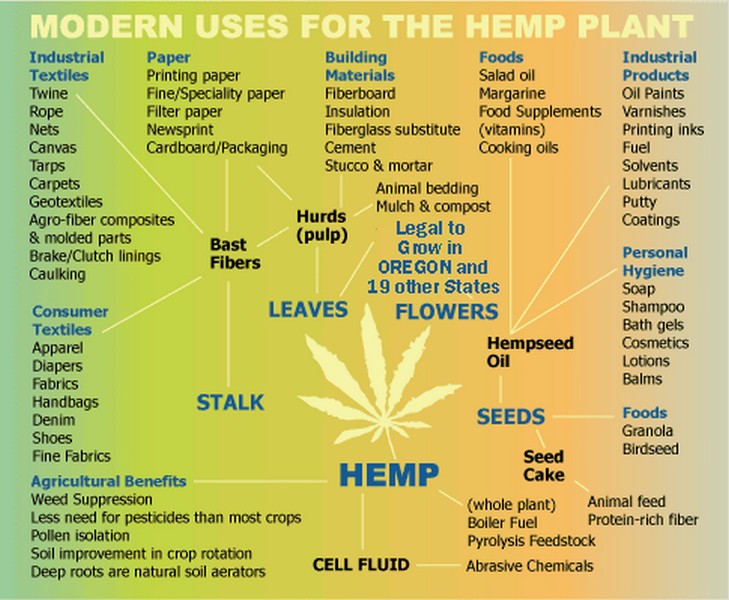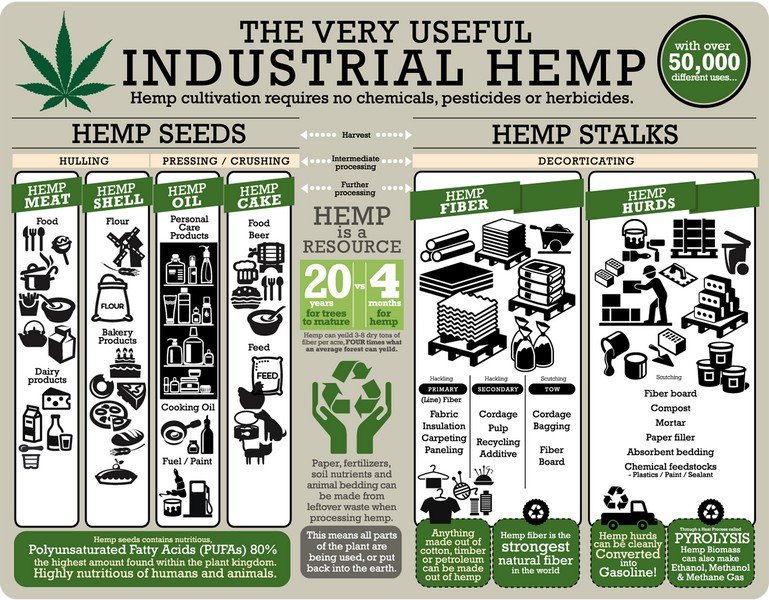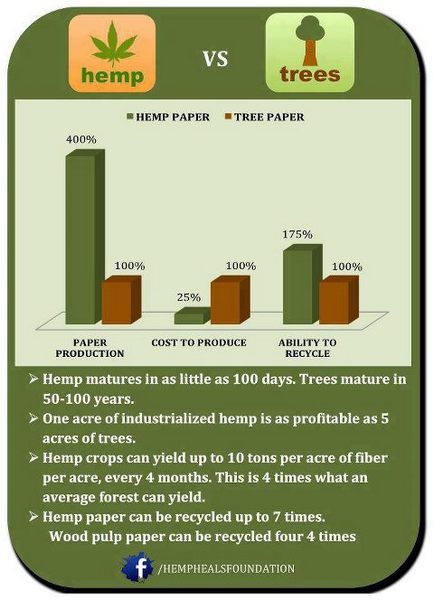Connecticut is over its ban on hemp. Beginning July 1, the industrial crop will be as legal as every other farmable thing. That flies in the face of the federal government’s criminalization of hemp.
“What this gets down to is the power of the people,” said Mike Maharrey of the Tenth Amendment Center. “When enough people tell the feds to pound sand, there’s not much D.C. can do to continue their unconstitutional prohibition on this productive plant.”
Experts suggest that the U.S. market for hemp is around $500 million per year. They count as many as 25,000 uses for industrial hemp, including food, cosmetics, plastics and bio-fuel. The U.S. is currently the world’s #1 importer of hemp fiber for various products, with China and Canada acting as the top two exporters in the world.
Connecticut joins the ranks of Vermont, Colorado and other states that are ignoring federal hemp prohibition. Oregon has handed out 13 hemp farming licenses so far. South Carolina, North Dakota, and Maine have laws that address the prohibition in different ways. President Obama signed a farm bill last year that authorized research on hemp for states which had already legalized it.
States That Farm Industrial Hemp
- Hawaii
- Kentucky
- Maine
- Maryland
- Montana
- North Dakota
- Oregon
- Vermont
- West Virginia
Over 30 Countries That Farm Hemp;
- Australia
- Canada
- China
- France
- Hungary
- Italy
- Japan
- Mexico
- North Korea
- Poland
- Romania
- Russia
- United Kingdom
INFORMATION ABOUT INDUSTRIAL HEMP
NORML Statement on the Cultivation of Industrial Hemp
“[T]he US market for hemp-based products has a highly dedicated and growing demand base. … [A] commercial hemp industry in the United States could provide opportunities as an economically viable alternative crop for some US growers.” – Congressional Research Service white paper, ‘Hemp as an Agricultural Commodity,’ 2013
Introduction Why are American farmers legally forbidden from growing a plant proclaimed by Popular Mechanics magazine to have the potential to be manufactured into more than 25,000 environmentally friendly products? It’s because the plant is hemp — also known as marijuana — and for more than 60 years, it has remained the U.S. government’s public enemy #1.
What is Hemp? Hemp is a distinct variety of the plant species cannabis sativa L. that contains minimal (less than 1%) amounts of tetrahydrocannabinol (THC), the primary psychoactive ingredient in marijuana. It is a tall, slender, fibrous plant similar to flax or kenaf. Various parts of the plant can be utilized in the making of textiles, paper, paints, clothing, plastics, cosmetics, foodstuffs, insulation, animal feed and other products.
Hemp produces a much higher yield per acre than do common substitutes such as cotton and requires few pesticides. In addition, hemp has an average growing cycle of only 100 days and leaves the soil virtually weed-free for the next planting.
The hemp plant is currently harvested for commercial purposes in over 30 nations, including Canada, Japan and the European Union. Although it grows wild across much of America and presents no public health or safety threat, hemp is nevertheless routinely uprooted and destroyed by law enforcement. Each year, approximately 98% of all the marijuana eliminated by the DEA’s “Domestic Cannabis Eradication/Suppression Program” is actually hemp.
Despite America’s bureaucratic moratorium on industrial hemp cultivation, a domestic industry exists and continues to grow. U.S. retailers and manufacturers annually import approximately 1.9 million pounds of hemp fiber, 450,000 pounds of hemp seeds, and 331 pounds of hempseed oil from Canada and other nations that regulate hemp farming. (Federal law permits the importation of hemp fiber, sterilized seeds, and ingestible hemp-based products containing no THC.) In addition, a growing number of health professionals are praising hemp seeds’ nutritional value, noting that it’s second only to soy in protein and contains the highest concentration of essential amino and fatty acids found in any food. Given the crop’s versatility, it’s no wonder that hemp has been endorsed by organizations and individuals such as the U.S. Agriculture Department’s Alternative Agricultural Research, the National Conference of State Legislatures, environmentalist Ralph Nader and health guru Andrew Weil.
History of Hemp Researchers trace hemp’s history as a fiber and food crop back some 12,000 years. During America’s colonial era, many of the founding fathers — including George Washington and Thomas Jefferson — espoused its manufacturing for rope, sails and paper. Early settlers also used hemp seeds as a source for lamp oil and some colonies made hemp cultivation compulsory, calling its production necessary for the “wealth and protection of the country.”
Hemp continued to be cultivated in America until 1937 when Congress passed the Marihuana Tax Act outlawing marijuana. Although not a bill specifically aimed at hemp production, legal limitations posed by the legislation put an end to the once prominent industry.
Hemp production briefly re-emerged in 1942 when the federal government encouraged American farmers to grow it for the war effort. Armed with the United States Department of Agriculture (USDA) film “Hemp for Victory,” thousands of farmers grew hundreds of thousands of acres of hemp for wartime needs. Unfortunately, when World War II ended, so did the government’s allowance of hemp cultivation. By 1957, prohibitionists had reasserted a total ban on hemp production. That federal ban remains in effect today.
Where does the DEA Stand on Hemp? Despite hemp’s emergence as a worldwide economic industry, the Drug Enforcement Administration (DEA) and Office of National Drug Control Policy (ONDCP) remain firmly opposed to it. Currently, only the DEA has the power to license farmers to legally grow hemp, even in those states where local laws permit it. Not surprisingly, the DEA has continued to deny every permit for large-scale hemp farming (In 1999, they did give Hawaii researchers permission to grow a one-quarter acre test plot of the crop.) within America’s borders for the last four decades.
In a 1995 USDA “White Paper,” the DEA stated that they are “opposed to any consideration of hemp as a legitimate fiber or pulp product,” and recommended that any USDA researcher who wishes to explore the issue must first be briefed by White House anti-drug officials. Since then, DEA officials have stonewalled several state efforts to enact hemp cultivation and research bills by threatening to arrest any farmers who attempt to grow it. Most recently, President George Bush’s spokesman Ari Flesher answered the question: “Does the President favor the legalization of industrial hemp?” by stating that Bush has not made “any statements … that would lend one to reach that conclusion.”
Hemp Today Although our federal government refuses to waver on hemp prohibition, public, state and international support is growing. The European Union now subsidizes farmers to grow hemp, which is legally recognized as a commercial crop by the United Nations Single Convention on Narcotic Drugs, the North American Free Trade Agreement (NAFTA), and the General Agreement on Tariffs and Trade (GATT).
In recent years, a number of U.S. states have commissioned studies recommending hemp as a viable economic crop. Most recently, legislatures in Montana and North Dakota have enacted legislation licensing farmers to grow hemp (though federal approval still remains necessary), hopefully paving the way for a renewed U.S. hemp cultivation industry in the not-so-distant future.
End NORML INFO
Could it be true?
Did the Government Give Industrial Hemp a Pass to Clean Up Radiation in the States?
Dr. Ilya Raskin of Rutgers University’s Biotechnology Center for Agriculture and the Environment, who was a member of the original task force sent by the IAEA to examine food safety at the Chernobyl site figured out that through phytoremediation utilizing hemp, among other plants, the soil, and thus the food supply could be saved from toxicity.
Phytoremediation is the process whereby green plants remove toxins from the soil. Plants can extract specific elements within their ecosystem and still thrive. They accumulate the toxins in their tissues and root systems but remain undamaged. Sunflowers have been known to do something similar for centuries, eliminating heavy metals and pesticides from damaged soil. Two members of the mustard family are also useful for this process – Brassica juncea and Brassica carinata, but it seems hemp is quite amazing at sucking up radiation.
Granted, the government is probably dumbfounded at what to do with the Fukushima radiation headed our way, but the legalization of hemp just might balance some of the toxicity scientists expect. Fortunately, California, one of the states that will be hardest hit, has already legalized industrial hemp, but it has to wait for the federal government to give states the right before they can actually grow it. The Farm Bill only allows ‘research’ growth at certain institutions in 10 states currently.
George Washington and Thomas Jefferson grew hemp. In light of Fukushima, let’s join our countries’ founders to grow it too. You can help clean the soil in your area if hemp or medical marijuana has been legalized in your state, and help it to pass in further states by being vocal with your state and federal representatives.










